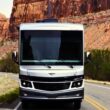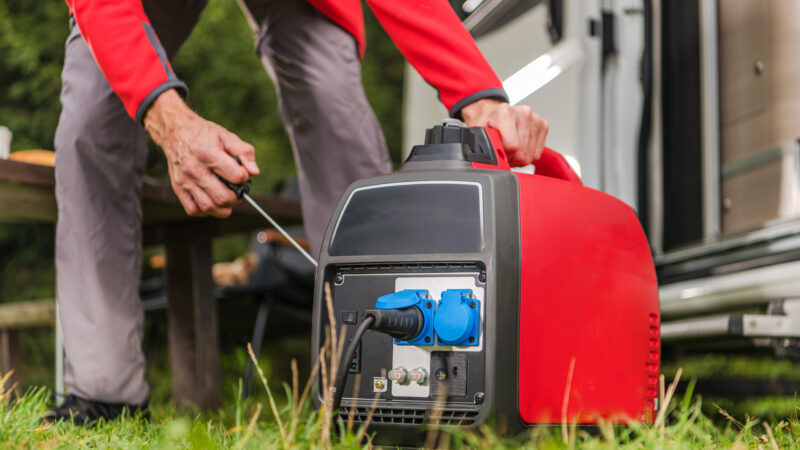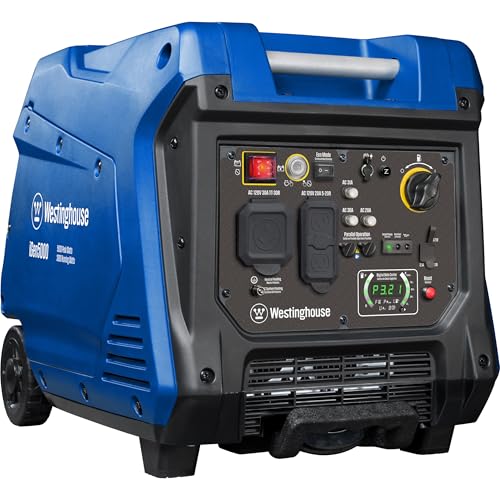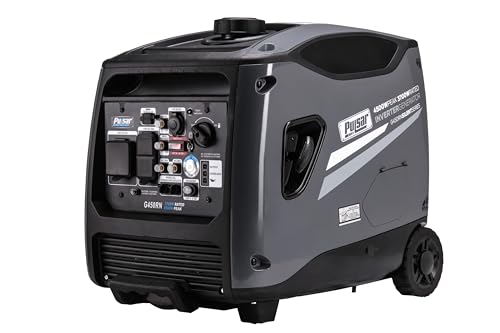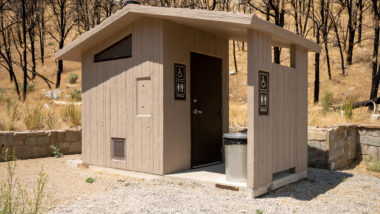Table of Contents Show
Are you looking for the best generator for an RV air conditioner?
If the scorching temperatures that blanketed parts of the country over the summer weren’t enough of a reminder, air conditioning is practically a necessity for many people these days.
And when camping in small poorly-insulated boxes, RVers need it too.
Unfortunately, campers don’t always have electrical hookups, or their electrical system falls short.
To run an A/C in an RV, you need a lot of power. So what do you need to know to find the best generator for an RV air conditioner? Let’s look at how these systems work.
How Many Watts Does an RV Air Conditioner Use?
Most RVers know that air conditioners are among their rig’s biggest power draws.
For a typical 13,500 BTU air conditioner, your system will need to provide 2,900 Watts of starting power, which decreases to 1,300 Watts on an ongoing basis to run it.
More powerful 15,000 BTU units will generally need 3,500 Watts to start and 1,700 to continue operating.
This is more than most RV appliances or systems, except for some high-wattage heating or cooking devices.
Can You Reduce the Starting Watts on an RV Air Conditioner?
If you’re worried that the initial starting surge might push you over the limit of your rig’s electrical system, we have a simple solution.
Simply purchase and install a soft starter, the best known of which is the Easy Start.
To understand how these devices work, consider how your A/C starts without one. It often has a loud thump as the compressor kicks on, drawing a surge of power to bring it up to speed quickly.
An Easy Start connects directly to your compressor and controls the power supply to your A/C. Instead of the massive spike most air conditioners cause, the soft starter device gradually increases the power to the unit until it’s ready to work. This creates a far lower starting peak.
These devices typically cost a few hundred dollars, with some owners needing to budget a bit more for professional installation.
But for those who can afford them, they can dramatically increase the versatility of your cooling and overall electrical use.
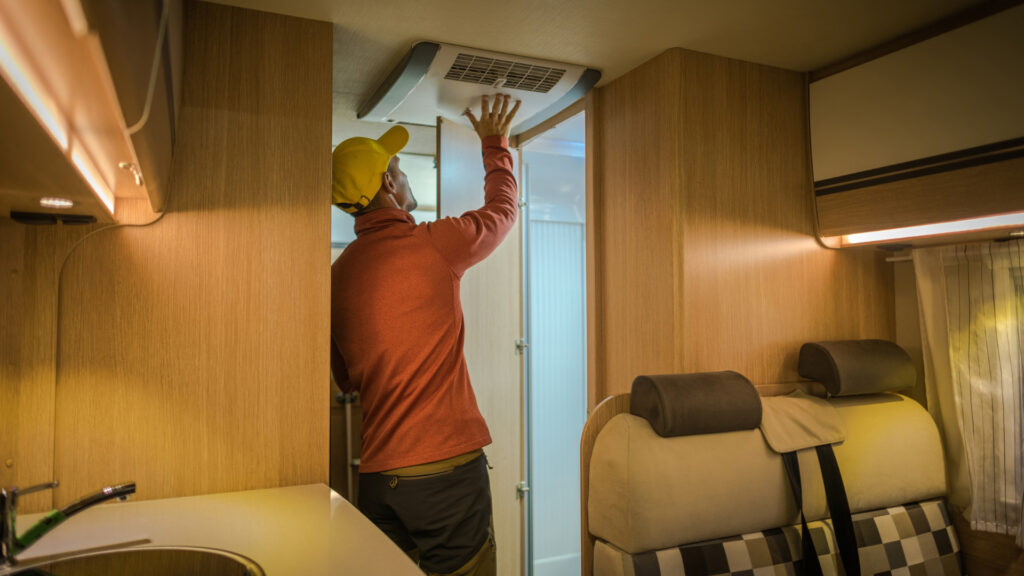
Can You Run an RV Air Conditioner on 30 amps?
Under many circumstances, you can run an RV air conditioner on 30 amps if you’re careful. A single RV air conditioner can draw half or more of your total available amperage during the initial startup.
This decreases significantly during normal operation, but surviving this initial surge without tripping the breaker is key.
Therefore, you’ll need relatively few other devices or systems turned on when your air conditioner kicks on.
Devices like the Easy Start can also dramatically reduce this initial amperage, allowing you more flexibility.
Things to Consider When Sizing Your RV Generator
Finding the best generator for an RV air conditioner isn’t quite as easy as picking up any old generator from the store.
There are a few key aspects you should consider before any purchase.
Power Needs
Obviously, how much power you need should be the primary concern when selecting a generator. You can find models over a considerable range from as little as 1,000 Watts to close to 10,000 or more.
Naturally, you’ll want a strong enough generator to provide the electricity you need and keep from overbuying to avoid wasting money.
Size and Weight
As with their generation capabilities, generators span a similarly wide range in size and weight. And it’s not always entirely correlated with how much power they can produce.
You’ll want to be aware of the size and weight for numerous reasons, including the extra weight it will contribute to your rig.
Size issues may dictate what type of generator you get, for permanently installed ones and portable generators that need to fit underneath or inside your RV for storage.
Keep in Mind: Solar power has become a bigger part of the RV community in recent years. So is it possible to Power an RV With a Solar Generator?
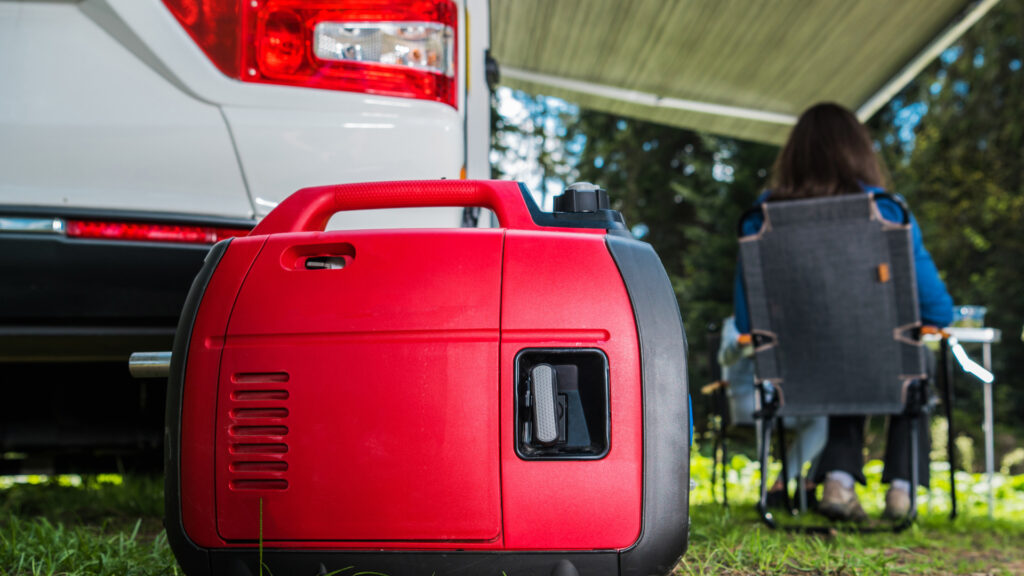
Fuel Source
What your generator uses to create power is also a critical factor in picking the best generator for an RV air conditioner.
Generators permanently installed in your rig will most often draw from the same gas tank your RV uses to drive.
However, most have a cutoff point below, which they won’t draw more fuel. This fuel choke prevents you from getting stranded if your generator accidentally drains your gas tank.
Portable generators may use gasoline, diesel, solar, or wind power. You can easily find gas, but you’ll need to keep enough on hand. Otherwise, you may run to the gas station when the lights go out.
In recent years, portable solar and wind-powered generators have also become more common for RVers. Depending on the conditions, these can typically produce modest amounts of electricity that may not be sufficient for heavy users.
Still, they offer the benefit of generating electricity just about anywhere, without the need to carry any external fuel like gas or diesel.
So the best generator for an RV air conditioner will have a reliable fuel source that you can easily get.
Reliability
An RV generator is an investment that buyers rightly hope to use for many years. But not all brands and models are created equal in reliability. Always read reviews and do your research before purchasing a generator.
If you can, talk to other RVers as well. They may have insights or thoughts you would have never considered that may help shape your buying process.
Best Generators for Running an RV Air Conditioner
There are quite a few RV generators out there. However, not all of them are suitable for running air conditioners and other devices.
We’ve combed through the list to find a few of the best generators for RV air conditioners.
Westinghouse iGen 4500
This gas-powered Westinghouse provides a peak wattage of 4,500, on top of a rated wattage of 3,700. And it can run for up to 18 hours in “economy mode.” It includes convenient features like a push-button remote start and an easy-to-use interface to monitor fuel levels and output.
Westinghouse also prides itself on the clean, stable power produced by its generators, which it says is perfect for sensitive electronics like TVs or computers.
- 5000 Peak Watts and 3900 Rated Watts at Less Than 3% THD; Telescoping Handle; Gas Powered; Remote Start With Included...
- Features a 5–20R 120V Duplex Household Outlet, an RV-Ready Tt-30R 30 Amp Outlet and Two USB Outlets – Great Choice...
Champion Power Equipment 4500
Another top RV generator, this Champion can also deliver 4,500 Watts at peak, with a running wattage of 3,500. With just a 2.3-gallon fuel tank, it can run for up to 14 hours, making it a very efficient choice for RVers.
At only 61 decibels, it’s also among the quieter and more lightweight options. Along with a 30-amp outlet for RVs, it includes traditional 20-amp outlets and an auto-style charging port.
- QUIET TECHNOLOGY: 61 dBA is great for RVs, tailgating, or camping with 4500 starting watts and 3500 running watts and up...
- PARALLEL READY: The optional parallel kit (sold separately) enables this inverter to connect with another 2800-watt or...
Pulsar G450RN 4500W
Our final choice for the best generator for an RV air conditioner is the Pulsar. It offers 4,500 peak Watts with a 3,700 running Watt-capacity.
It comes with a remote start capable of booting up the generator from 80 feet away, meaning you won’t even have to leave your seat to turn it on.
The G450RN provides up to 12 hours of power from just a two-gallon tank. Like our previous two choices, it’s also parallel capable for those who need additional Wattage.
This can work great for large RVs running the air conditioner, fridge, and other high-power devices.
Keep in Mind: Beat the heat outside your RV with one of these top rated Battery-Powered Fans for Camping
- 4, 500 peak watts/ 3, 700 running watts
- Capable of up to 15 hours of extended operation at half load on 3. 2 gallons of fuel
Stay Cool While RVing
There’s no need to sweat out those hot summer days just because your RV power system isn’t up to snuff.
You can run an air conditioner on an RV generator, especially with the help of devices like the Easy Start. Remember to consider the size, weight, and capabilities before purchasing.
So what size generator do you need to run your RV A/C? It depends on how much power your unit draws. But you’ll likely need a generator that provides at least 2,900 Watts on startup and 1,300 to run.
With this information, we hope you have no trouble finding the best generator for RV air conditioners, no matter your needs.
Last update on 2025-01-23 / Affiliate links / Images from Amazon Product Advertising API
